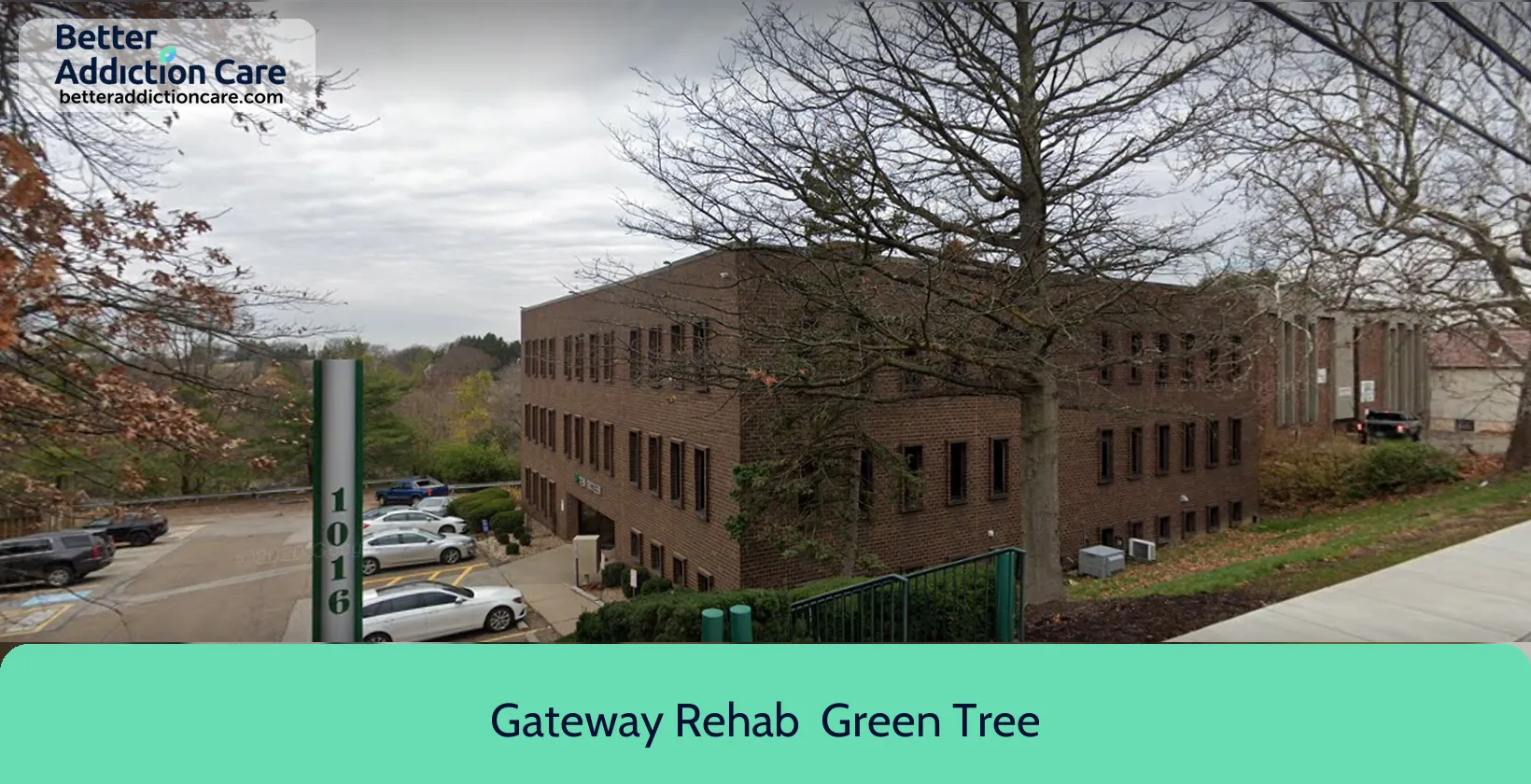Gateway Rehab - Green Tree
Overview
The Green Tree clinic of Gateway Rehab, situated near Pittsburgh, Pennsylvania, provides extensive and adaptable drug recovery programs tailored to adult clients' various requirements. The clinic uses an evidence-based strategy that guarantees each client gets individualized treatment with the goal of obtaining and sustaining long-term sobriety.
The Medication-Assisted Treatment (MAT) program at Gateway Rehab is one of its main initiatives. This program supports clients on their recovery path by combining medicine and psychological therapy in a unique way. The MAT program lowers the chance of relapse and assists clients in navigating the difficulties of withdrawal by treating both the psychological and physical elements of addiction. The program also incorporates continuing support and evidence-based therapy to strengthen the healing process.
An extensive schedule of individual and group therapy sessions, usually conducted four to five times a week, is provided by Gateway Rehab's outpatient treatment program. The goal of these sessions is to give individuals the skills they need to overcome addiction. Eye Movement Desensitization and Reprocessing (EMDR), a cutting-edge treatment that has shown promise in aiding people in their recovery from drug misuse, is one of the therapies provided. With treatment regimens customized to meet each client's unique requirements, the outpatient program likewise places a strong emphasis on individualized care.
A wide spectrum of people may obtain therapy at Gateway Rehab's Green Tree facility since it takes the majority of commercial insurance coverage. The clinic provides help in figuring out out-of-network benefits and comprehending the scope of insurance coverage for drug misuse treatment for those who are unclear about their coverage.
Gateway Rehab, which has Joint Commission accreditation, is dedicated to offering patients who want to kick their addiction and start over a healthy life high-quality, efficient treatment.
Gateway Rehab - Green Tree at a Glance
Payment Options
- Cash or self-payment
- Medicaid
- Private health insurance
- Federal military insurance (e.g., TRICARE)
- Federal, or any government funding for substance use treatment programs
Assessments
- Screening for tobacco use
- Comprehensive substance use assessment
- Outreach to persons in the community
- Screening for mental disorders
- Screening for substance use
Age Groups
- Adolescents
- Children/adolescents
- Adults
- Young adults
Ancillary Services
- Case management service
- Suicide prevention services
- Mental health services
- Transportation assistance
Highlights About Gateway Rehab - Green Tree
7.37/10
With an overall rating of 7.37/10, this facility has following balanced range of services. Alcohol Rehabilitation: 8.00/10, Drug Rehab and Detox: 8.15/10, Insurance and Payments: 6.00/10, Treatment Options: 7.33/10.-
Drug Rehab and Detox 8.15
-
Alcohol Rehabilitation 8.00
-
Treatment Options 7.33
-
Insurance and Payments 6.00
Accreditations
The Joint Commission:

The Joint Commission accreditation signifies that a facility has met rigorous standards of excellence in patient care, treatment, and safety. It assures individuals and healthcare professionals that the accredited facility provides high-quality, evidence-based care for addiction and mental health issues, fostering trust and confidence in their services.
Treatment At Gateway Rehab - Green Tree
Treatment Conditions
- Alcoholism
- Substance use treatment
- Mental health treatment
- Opioid Treatement
- Co-occurring Disorders
Care Levels
- Outpatient
- Outpatient methadone/buprenorphine or naltrexone treatment
- Outpatient day treatment or partial hospitalization
- Intensive outpatient treatment
- Regular outpatient treatment
Treatment Modalities
- Cognitive behavioral therapy
- Telemedicine/telehealth therapy
- Substance use disorder counseling
- Trauma-related counseling
- Smoking/vaping/tobacco cessation counseling
Ancillary Services
Languages
- Sign language services for the deaf and hard of hearing
Additional Services
- Pharmacotherapies administered during treatment
- Mentoring/peer support
- Breathalyzer or blood alcohol testing
Special Programs
- Clients who have experienced trauma
Get Help Now
Common Questions About Gateway Rehab - Green Tree
Contact Information
Other Facilities in Pittsburgh

6.62

6.62

6.80

6.62

6.62

7.05

6.86

6.56
DISCLAIMER: The facility name, logo and brand are the property and registered trademarks of Stern Center, and are being used for identification and informational purposes only. Use of these names, logos and brands shall not imply endorsement. BetterAddictionCare.com is not affiliated with or sponsored by Stern Center.

